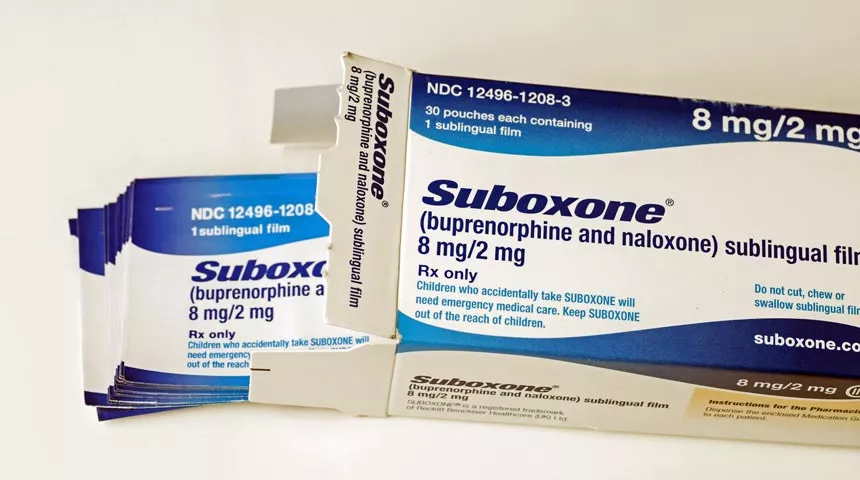The United States is in the middle of an opioid epidemic. Every year tens of thousands of people die as a result of the abuse of and addiction to this powerful class of drugs and while addiction treatments have certainly improved, there are still many downsides to the options available today. Since opioid addiction is so hard to overcome a Suboxone detox is vital to a safe recovery.
Suboxone is one of the most popular medications used to treat opioid dependency. And although it can be very effective at combating the intense withdrawals and cravings associated with opioid addiction, this drug is itself highly addictive and deceptively dangerous.
If you or someone you know are a part of the surprisingly large population that becomes addicted to Suboxone each year, it’s critical that you recognize the signs and get the professional help you need to overcome this crippling addiction.
What Is Suboxone?
Opioids have a reputation for being one of the hardest drugs to detox from. The cravings alone for drugs like Heroin, OxyContin, and other prescription painkillers can be absolutely overpowering. To make the process even worse, the withdrawal symptoms recovering addicts experience can be especially uncomfortable, overwhelming, and downright painful.
Drugs like Methadone and Buprenorphine (the main compound in Suboxone) help to alleviate these withdrawal symptoms because they are in fact opioids themselves, though much less potent than other commonly abused opioids. As a result, they activate the same receptors in the brain that drugs like heroin interact with, only to a much smaller degree.
Suboxone finds itself being used in controlling other opioids. It’s a cornerstone in Medication Assisted Treatment (MAT) and can be obtained from many MAT facilities. However, because it can be abused, access to the substance is strictly controlled to ensure that only those people that need to use it get access to it.
Suboxone is known as an opioid antagonist. Most opioids taken recreationally are known as opioid agonists. As an antagonist, Suboxone works against these opioids, making them less effective and negating their ability to control pain. When taken to as a method of opioid addiction treatment, it can help a person control their urges. It can also help manage the symptoms of withdrawal that a person may go through during detox.
Suboxone Addiction

As mentioned above, Suboxone is an opioid, and like other opioids, it can become addictive. But what is addiction, really? Addiction starts with dependency. The moment you take an opioid, it starts working to control your brain’s pain response. Unfortunately, the side effect of this control is a massive euphoric release in the brain. This release comes from a flood of dopamine in the brain.
Dopamine is the chemical that makes us feel accomplished or happy once we complete a task. It’s the brain’s way of rewarding us for a job well done. However, it can also be a double-edged sword where opioids are concerned. When you consume an opioid, dopamine floods your brain much greater quantities than you’ve experienced before. You get this euphoric feeling, but it also causes your brain to adapt to the excess dopamine, changing your anatomy permanently. This leads to you needing more dopamine to get the same response from your body.
Suboxone and Brain Chemistry
Your brain can’t naturally produce that same sort of dopamine on its own, and as a result, you may become dependent on suboxone or some other opioid in your bloodstream just to function normally. Without the drug in you, your brain gets fuzzy and you can’t go through your day because you’re distracted by cravings. Dependency is the first step toward addiction. While people may use the terms interchangeably, they aren’t.
Addiction is a mental condition that makes a person do things they wouldn’t normally do to get access to the substance they’re dependent on. These decisions may endanger their lives or their livelihoods, but because their cravings blind them, they don’t have any way to stop themselves. In many cases, this mental condition can help them rationalize their decisions, making it seem like a good idea to seek out the substance they depend on.
Are You Addicted to Suboxone?
Suboxone addiction can happen to anyone who uses the drug in a way it was not meant to be used. When used in moderation and only as prescribed, Suboxone can be incredibly powerful in helping individuals overcome their opioid dependency. Oftentimes Suboxone users are able to continue their daily lives without suffering from symptoms of opioid withdrawal at all.
However, when used in the long-term some patients may find it incredibly difficult to taper off of Suboxone and may experience similar symptoms of withdrawal and cravings similar to that of the original drug addiction. Some people may also treat Suboxone as a substance of abuse, using it in combination with other drugs in order to bring on feelings of euphoria and a drug-induced high.
If either of these situations sounds familiar, you may in fact be struggling with a Suboxone addiction. And without proper treatment, as with any opioid addiction, it may be difficult if not impossible to get clean on your own.
Further Signs of Suboxone Dependence
Drug abuse can be a tricky thing to get a hold of. The physical symptoms of being addicted are one thing; the psychological symptoms are quite another. Knowing how to spot both of these within yourself or those close to you just may help early identification of a habit and thus, early therapeutic intervention for the substance use disorder.
Some of the physical symptoms or signs of addiction can be dilated pupils, muscle weakness, slow or slurred speech patterns, and poor coordination. Behavioral manifestations might be missing appointments and even a decline in personal hygiene.
The psychological symptoms of opioid use disorder are a lot harder to spot because they aren’t as obvious and overt. They are still there, however. One might notice a change in personality, perhaps being more prone to irritability. When access to the substance is limited, there might be a rise in generalized aggression or discomfort.
This is a clear sign of opioid dependence. Generally, whether it be suboxone or other opioids, addiction to opioid drugs results in a rise in mental health issues. What this means is that there is a direct correlation between increased substance abuse and a decline in one’s mental health.
That’s where Find Addiction Rehabs comes in. We’ll help you find the mental health services with the comprehensive treatment plan you need to kick your Suboxone habit for good.
Suboxone Inpatient Treatments
Treating a Suboxone addiction requires more than just willpower. In order to overcome a dependency on this drug you’ll need the support, guidance, motivation, and expertise of a professional treatment center staffed by knowledgeable and dedicated medical professionals.
During your Suboxone inpatient treatments, you’ll likely go through two distinct phases: detox and rehabilitation.
The Detox Phase
As your body gets ready to undergo a suboxone detox program, the focus is primarily on making you comfortable while your body gets used to functioning without the help of Suboxone. Detox is a method of controlled withdrawal. Withdrawal symptoms typically happen after a person stops using Suboxone, and they can occur as soon as one to three days since the a person last took the drug.
The symptoms will vary from person to person, and no two people go through withdrawal the same way. While getting through this phase can be tough, it’s an essential part of any treatment program. Detox is the first step in recovering from the drug because it helps to break the physical hold the substance has on a person. This is crucial, since it helps them face the second step in the recovery process. Without a physical hold, it becomes much easier to break the mental hold the substance has on a person.
Detox Considerations
The detox process can be tough. Opioid dependence is no joke, and this is the first stage of recovery. By doing a drug detox, you’re essentially purging your body of it’s physical addiction to suboxone. You will experience withdrawal symptoms and having the support necessary during that time is critical.
When you undergo suboxone detox it is important to keep in mind the suboxone withdrawal timeline. In essence, this refers to the period of time through which you can expect to experience opioid withdrawal syndrome. This is the period of time in which you can expect physical symptoms of the body being deprived of the substance. For Suboxone, this can last as many as ten days.
For this reason, when it comes to detox treatment, just about every medical professional would make sure that clients are aware of the possibility for non medicated detox and medicated detox. In essence, medicated detox includes not just medical supervision, but medication assisted treatment to limit, as much as possible, the effects of the absence of suboxone. This is done in an attempt to limit the severity of the physical symptoms.
The Rehab Phase
The rehabilitation phase is where you’ll dive deep into why you became addicted in the first place. This phase will typically consist of educational programs, stress management techniques, and counseling sessions that you can use to better understand addiction and know how to avoid relapsing as well.
However, treatment programs are not one-size-fits all. As such, it’s critical that you find a program that’s tailored specifically to your needs. The representatives at Aid in Recovery can help find the right program for you so that you can be confident in your success.
Dealing with Withdrawal Symptoms from Suboxone
Substance abuse problems can be debilitating to one’s quality of life. The physical dependence of the substance is one of the major factors that keep most people trapped in the cycle. of drug addiction. This very thing is the reason that quitting cold turkey is such a daunting task for most. Just as opioid detox can be an incredibly uncomfortable experience, the withdrawal symptoms from Suboxone addiction are likely to be overwhelming for many. Some of the most common withdrawal symptoms include:
- Body aches
- Intense anxiety
- Gastrointestinal problems
- Diarrhea
- Insomnia
- Severe cravings
- Fever
- Incessant itching
- Loss of appetite
- Chest fluttering sensations
- Restless legs
- Nausea and vomiting
The length of time you’ll experience these withdrawal symptoms varies from person to person. Some may suffer through the withdrawals for several days while others may feel the effects for a week. Ultimately though, the suboxone withdrawal symptoms are certainly not to be taken lightly.
Severe withdrawal symptoms often lead recovering addicts to fall back into familiar habits, frequently putting them at risk for continued abuse and the redevelopment of addiction.
Beyond that, individuals who have gone through recovery only to relapse soon after are at an especially high risk of life-threatening overdose. As the patient continues through the recovery process, the body’s tolerance begins to drop quite rapidly. The same dosage used before recovery, then, may actually become deadly for some.
Suboxone Detox Centers & Treatment Facilities Info

At Find Addiction Rehabs, we help to ensure that your recovery from Suboxone addiction is both comfortable and successful. Our network of providers features an enormous variety of treatment options suited for nearly any individual situation.
Our inpatient Suboxone detox centers and rehab facilities offer housing options that allow you to focus 100% on your recovery without being subject to the same environment that fostered your addiction in the first place. Think of it like a getaway that’s not only full of impressive amenities but also one that will help you kick your Suboxone addiction for good.
Our network facilities also feature a professional and knowledgeable staff that are well-versed in the physical and mental difficulties of detoxification from Suboxone dependency. They can help make the withdrawal process infinitely easier and more comfortable.
And finally, your recovery may also include a number of rehabilitation treatments such as counseling, group talk, and life strategy classes. These treatments will not only help you get to the root of your addictions, but will also teach you a variety of techniques to help you manage cravings and effectively deal with stress without turning back to abusing Suboxone.
When you partner with Find Addiction Rehabs, you can rest assured that your inpatient Suboxone detox will be as comfortable and hassle-free as possible. For more information on the facilities within our network, call our toll-free number today at any time, day or night.
Frequently Asked Questions
Making the choice to partner with an inpatient Suboxone detox facility can be tough to do. You’ll likely have a number of questions in mind about what’s involved in the process, what to expect from withdrawal treatment programs, and more.
Below are just some of the most commonly frequently asked questions from patients treating their addiction.
[rank_math_rich_snippet id=”s-35ebaed9-d801-4009-b7e3-7fcde9e8c9f4″]
For a list of other common concerns for patients interested in enrolling in a detox and/or addiction treatment program, be sure to check out our helpful article on building life skills in recovery.
Suboxone Detox Reviews
Though Suboxone is meant to be used as a treatment for opioid dependency, that doesn’t mean an addiction to it is any less dangerous. Suboxone addiction can and does ruin lives, and it can do the same for you.
That’s why it’s so important to use Find Addiction Rehabs to help you find the right inpatient Suboxone detox centers for you. We’ll help you through every step of the process – from your initial consultation and arranging travel specifics all the way through treatment and your eventual full recovery.
Call Our 24/7 Suboxone Toll-Free Line Today
By making the choice to get treatment for your Suboxone addiction, you’re taking the first step on a road to a fulfilling and addiction-free life. And by doing so, you’re also overcoming the hardest part of getting clean – admitting that you need help.
Don’t try to tackle your addiction alone. Call our 24/7 Suboxone toll-free line today and speak to a qualified specialist to help you decide on the next steps towards getting the help you need. We can answer any questions you may have about the Suboxone addiction treatment process or about Suboxone addiction in general.
We even offer potential same-day placement in licensed Suboxone detox centers.
If you or someone you know needs help with Suboxone abuse Find Addiction Rehabs is here to help. Call anytime 7 days a week 24 hours a day, help is here!


